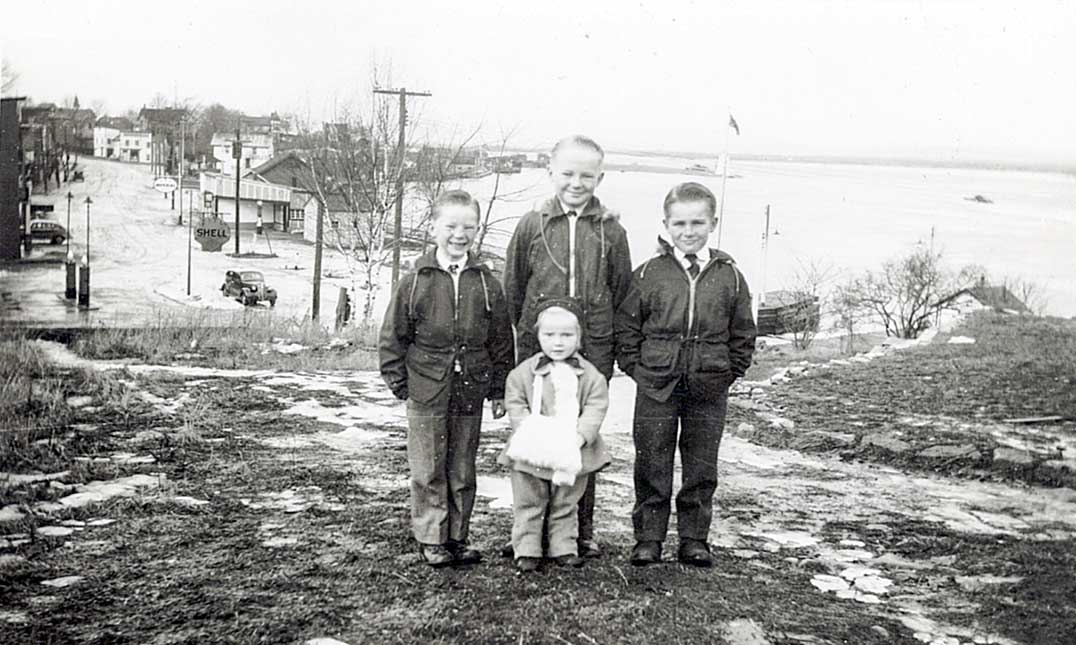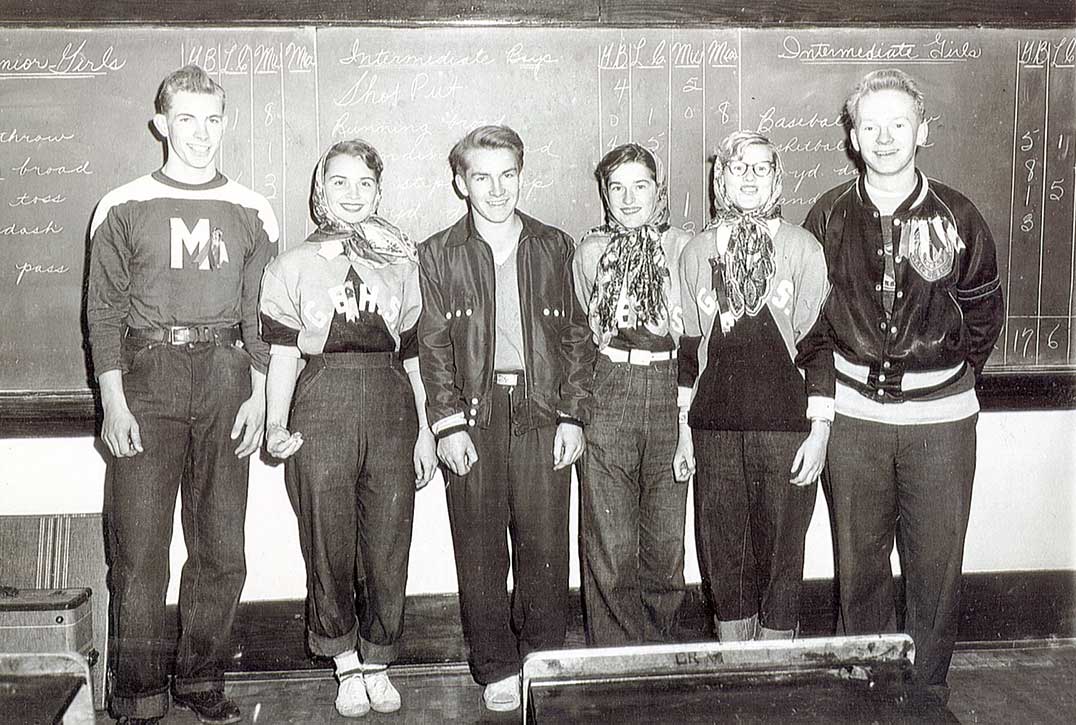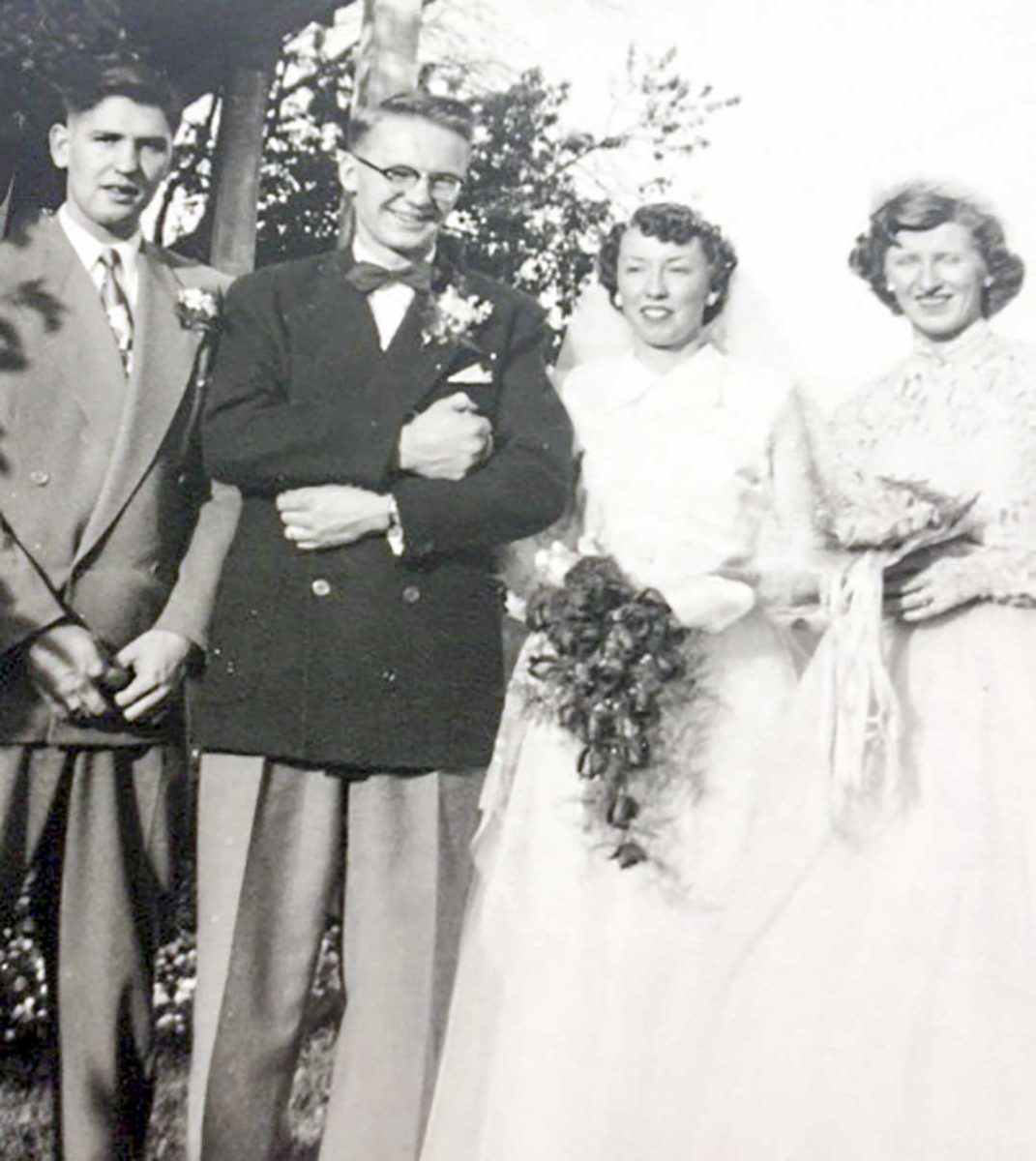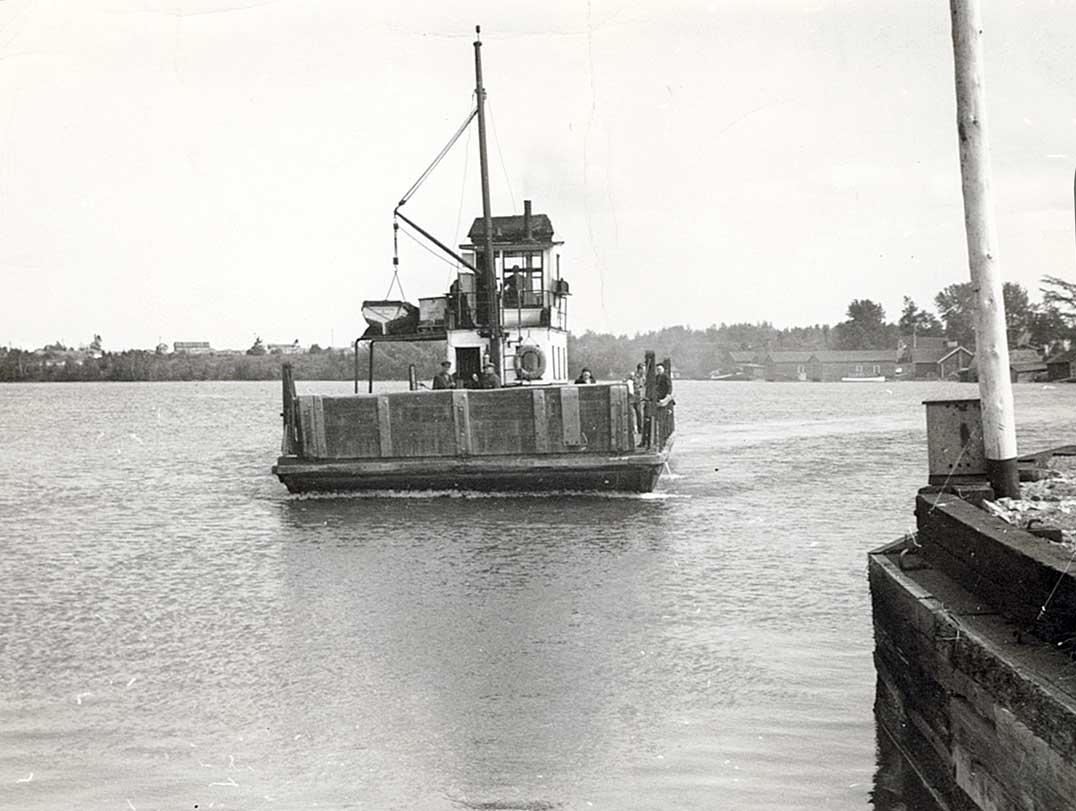Lorne Ebel
At the time of our meeting, Lorne was happily ensconced amid his relatives in Mindemoya, far from his home in Orangeville. Many formative years were spent on Manitoulin and he harbours fond memories of the Island. One such recollection is the ‘Jacqueline,’ the ferry his dad had commanded from 1942 until that ferry service was discontinued. The Jacqueline had been a lifeline, crossing the North Channel in Little Current to Goat Island, connecting Manitoulin Island with the North Shore. Many vital services on the Island depended on this ferry, before the train bridge was opened to car traffic in 1944.
Grandfather Herbert Ebel was of German origins. He arrived from Southern Germany, near the Swiss border, and settled in the Kitchener area. Grandmother Amy Ebel (nee Myles) lived near Lions Head on the Bruce Peninsula. Maternal grandfather John Matheson was born two months after his Scottish parents arrived in Canada and settled in Southampton. He married Annie Anderson and made his livelihood fishing from his tugboat. He would head out for three days and return with close to 2,000 lbs of fish.
Lorne was born in Southampton on September 8, 1934 to Captain Harold (Cap) Ebel and Isabel (nee Matheson) Ebel. They had three more children, John who lives in London, George, deceased, and Heather Highgate, who lives in Chatham.
“One of my first poignant memories of my Dad as a Great Lakes sailor was his being shipwrecked. It had been two months since I had seen him. He was on the trawler ‘Gilly’ that carried pulpwood from Manitoulin. The boat ran aground during a wild storm, the night of September 18, 1937, partway down the Huron coastline, near Goderich. Thankfully, he survived the calamity and was soon back on the freighters.”

Cap became First Mate of the ‘Sir Thomas Shaughnessy,’ a 500 ft, 10,000-ton freighter carrying iron ore and coal. Coal was picked up in Pennsylvania, Erie and Cleveland, and transported to Little Current. It was unloaded on the coal docks or directly loaded into rail cars headed for Sudbury to fuel the smelter or refinery. The ship went empty to Thunder Bay, then would be loaded with grain or iron ore to be taken to Toronto, Hamilton or Port Colborne. During World War ll, iron ore went from Steep Rock, Wisconsin to Port Colborne, Ontario.
“Some of my favourite holidays would be a trip from Southampton with mother, to see dad in various ports of call. We would spend two or three days on the ship with him, sometimes staying in the passenger quarters. Since war was on, dad had to help us through security. Port Colborne, Little Current or Goderich were regular ports where we would meet him.”
In June of 1942, the war raging in Europe, Captain Harold got hired by the Department of Highways, to command the Jacqueline in Little Current. Previously Captain Ebel had left home in March and returned at Christmas, but now he was home every night, allowing for a much closer-knit family. His wife and three sons were happy. “Heather, our true Haweater, was born later.”

The Jacqueline transported cars and people. Three fully licensed captains were required because the ferry ran seven days a week. She ran every 30 minutes between 6:30 am and 11:30 pm, docking at midnight. This worked out to at least 24 trips a day or 168 crossings in a 48-hour week. The captains had two days off each week. The bridge in Little Current was built for the railway at first, allowing the mail train to arrive and depart once a day. The rest of the time the bridge was left open.
When the family arrived in Little Current in 1942, their house was just being built, so the family rented a house. “There was no indoor toilet or running water at the time. The water main just extended to the area behind the OPP office. It was about 1948 when mayor Bill Crabbe decided to include the rest of the town for water mains. A company form North Bay, Baldasaro Construction, did the work for about $250,000.”
“I was eight when we arrived to Little Current and I started in Grade 3. My teacher for three months was Glen Cond. He joined the Royal Canadian Navy and left his teaching profession. He later returned from the war and died just two years ago.”
“My mother worked outside the home too. She helped open and then run the Eaton’s office in downtown Little Current. It was expected that we would do chores at home, so dishes were often a responsibility I inherited. I washed and dried,” he continues. “I was glad we had a dog, Sailor, a Boston Terrier to welcome us home each day, and he was much loved.”

After the bridge was planked for cars, the ferry was no longer needed. Similar ferries ran across Lake Ontario, one such crossing between Adolphustown in Prince Edward County and Glenora near Kingston. (This ferry is still in operation.) “Dad ran that ferry for one season.” In the late 1940s Cap worked for the North Shore Timber Company. He was captain of the tug, the Nordawn, that ran from McGregor Bay and Baie Fine, carrying pulpwood to the Northern Paper Mill. The Nordawn escorted the freighter Normill out of the harbour for its journey to Sault St. Marie and Green Bay, Wisconsin. Some of the logs carried on the Nordawn were used to fashion log homes in Little Current.
“Later dad worked for the Timken family of Timken Rollerbearing Company, of Canton, Ohio, managing their private residence and their yachts west of present-day Red Deer Village. When then-President F.D. Roosevelt came for his famous fishing trip to McGregor Bay in 1943, he stayed in the same area as the Timken residence prior to his Quebec conference regarding the war ending. Local fisherman Donald McKenzie was the guide for the president.”
Lorne recalls ships like the Manitoulin that had a one-week schedule, leaving Owen Sound at midnight Monday, reaching Killarney first, then Manitowaning, Little Current, Kagawong, Gore Bay, Blind River, Thessalon, Sault St. Marie, Lake Superior for one day and then back to Owen Sound by breakfast on Saturday. Boats were critical to commerce at the time. The Owen Sound train schedule dovetailed with that of the Manitoulin, carrying passengers and baggage from Union Station to the dock at Owen Sound.

The Temperance Act of the 1920s made it illegal for liquor to be sold in town. Prior to the plebiscite to change the act, Don Delaplante, a reporter from the Toronto Telegram, came to Little Current and took photos of some young locals sitting on the curb of Ritchie’s store, drinking beer. The TD bank now sits where the store was. The photo made the Toronto Telegram two days later. The local plebiscite in 1948 led to the legal sales of liquor in Little Current. This meant local citizens no longer had to take a taxi to Espanola to get liquor.
“My first job was at the Fairway Stores in Little Current for $15 a week. Mr. Elmer Vincent owned that store. His dad had been the first owner of the home that is currently the OPP station in the town. Although I was just a teen, I learned a lot from Mr. Vincent who was a well-respected businessman on the Island.” Lorne changed jobs and began to work for Mr. Morland Ritchie or W.D. Ritchie and Sons, the grocery store, where he got more hours and a higher rate of pay. “Again, I learned more about the retail business from another respected businessman and a nice gentleman to work for. Mr. Ritchie also liked to play the piano on Sunday mornings and the music would drift through his open door and down the street.”
W.D. Ritchie & Son was basically the only grocery store in town that allowed customers to have charge accounts. About 90 percent of the customers took advantage of that feature and paid their bills on payday. A few customers did not pay their accounts and their credit would be cut off. They would then shop elsewhere but would often return after a few months and ask for the restoration of their accounts. Mr. Ritchie would occasionally give them a clean slate but state that they would have to pay in full or be permanently cut off for credit. This was Mr. Ritchie’s way of being charitable and at the same time attempting to teach financial responsibility.

By 1953, Lorne had graduated from high school in Little Current. “To this day, I can recall the great school spirit among the students and teachers. That positive ambience was there all through my high school years. This was reflected in the blue and gold yearbooks.” Lorne remembers with fondness, some of the great hockey and baseball teammates he had the privilege of playing with and against. Lorne’s dad was the manager of the hockey rink in the winter and he coached as well, helping his teams develop good sportsmanship.
Lorne did the sports writing for the yearbook and for The Expositor through 1949-51 and recalls the many great sports photos taken by publisher and photographer Bill Patterson in the late 1940s. He has fond memories of the Pool Room and the movies in the Shaftesbury Hall on Saturdays, despite the lack of popcorn. He remembers playing badminton and other activities at the United Church hall.
Meanwhile, Doris ‘Dori’ Hughson had started working for the Manitoulin and North Shore Telephone and Telegraph Company, or M&NST&T Co. for ‘short,’ owned by the Turner family. Lorne met Dori on a blind date. “Our first date turned out to be a rather interesting event. It was the ‘turkey roll’ dance in the old hall at Sheguiandah, on a Saturday night. Tickets were purchased and placed in a drum. The winning ticket would be ‘rolled’ out. Thus, the name turkey roll.”

The couple were wed in the Little Current United Church on October 11, 1953. “This began what is now our 65-year journey.” Lorne started his career with S. S. Kresge Company with his first position being at the Kresge store on Elm St. in Sudbury. He also started his management training. Many years and a lot of transfers later, he ended up as vice president of K Mart Canada at the Canadian head office in Brampton.
The couple had four children, Matheson, Lisa, Gregory and Pamela. Matheson, a University of Toronto graduate, had a surveying practice in Sudbury. He also played the bagpipes and was part of the Copper Cliff Highlanders; but sadly, he passed away at age 44. Lisa Bourdeau, a graduate of Niagara College in Early Childhood Education, is retired mow and living in Elliot Lake. Gregory, a graduate of York University and Harvard Business School, worked in the Energy Field in Houston, Texas. He just retired. Pamela Mauti, a graduate of York University, is a teacher for the Peel School Board in Caledon.
“I am most proud of my family. Being a parent is the most special and awesome opportunity we have had. Watching them discovering their skills as these emerged was rewarding. Experiencing 11 grandchildren was another ‘wow’.” Lorne retired from K Mart Canada in 1993 after having enjoyed a productive career through 13 different transfers across Canada. Each new location became home for his family for a few years. Lorne also made business trips to China, Japan and Taiwan.
The Rotary has been a part of Lorne’s life for 40 years. He is also a past-president of three different clubs and a recipient of a ‘Paul Harris’ award. Lorne enjoyed participating in many great Rotary projects. He also became Chair of the Hospital Board and helped build the new Headwaters Health Care Center in Orangeville. Lorne continues to be very involved with the Westminister United Church there. Recreational pursuits included hiking, biking, kayaking, Tai Chi, reading and, of course, travelling with Dori.
“My favourite time of the year? I really enjoy all seasons; each has its own unique and pleasurable highlights. Favourite book? It’s ‘Lord Moran’s Diary’. Lord Moran was Winston Churchill’s personal physician. He always felt Winston had been a bit of a hypochondriac. It was a good read.”
Favourite quotation: “You’re only as big as the things that bother you so don’t worry about the little things.” “The author is not known but the quotation was also used in a book by Joel Osteen and Google has used it as a quote of the day, listed under ‘Brainy Quotes’.” Lorne had been using it long before Google adopted it. “One person I admired was Little Current businessman Elmer Vincent. He was a straight shooter and very considerate of others. One time he visited me at work in my Brampton headquarters. I introduced him to the president of the company at the time.”
Strengths that seem apparent for Lorne, include his keen memory, being a history buff and being a vital part of the community. “I have no regrets, there is nothing I would do differently if I could go back in time, but I would like to return to one or two places in the 70 different countries we were privileged to visit. Scotland and the Galapagos Islands would be at the top of the list. Last fall, we had a spectacular cruise from Athens through the Suez Canal, spending two days in the ancient town of Petra, Jordan. Then we were off to Dubai, Abu Dhabi and Al Ain.”
“Of all the places we have been over the years, this place, Manitoulin, feels most like home, even though we live in Orangeville, headwater country; the highest point in Ontario, the headwater area with four rivers running in different directions. We love to return to the Island when we can. Dori is from Manitowaning, from the Budges Rocky Ridge Farm, in the community of Budges on Bidwell Road where she also went to school. Mr. Budges was the first reeve of Assiginack. Dori still has relatives living on Manitoulin.”
“The ambience and history of this island is outstanding. There really is no place like this anywhere else. I have always had a keen interest in sharing the bit of history that surrounds the ferry dock of Little Current. Lorne recalls some of those highlights now: “The school bus loads of young Indigenous students who left the dock, teary-eyed, like their parents, to attend the boys’ and girls’ Residential Schools on the North Shore at Spanish from September to June. There was the Roosevelt visit and lastly, I recall the number of military personnel who waved goodbye to family and friends on that dock to assume combat roles in World War Two; some never to return. That pier was the center of activities for decades and action should be taken to ensure the preservation of this historical site.”
“Let’s not lose the memories.”




